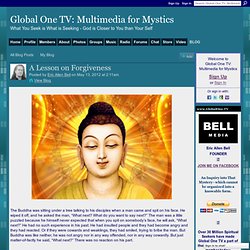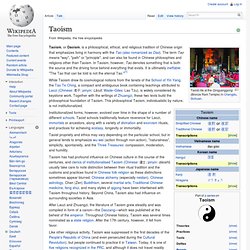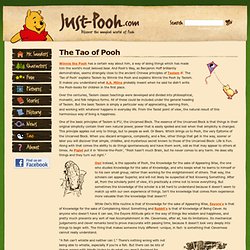

Welcome to TrueTao.org / Taoism.net. A Lesson on Forgiveness. The Buddha was sitting under a tree talking to his disciples when a man came and spit on his face.

He wiped it off, and he asked the man, “What next? What do you want to say next?” The man was a little puzzled because he himself never expected that when you spit on somebody’s face, he will ask, “What next?” He had no such experience in his past. He had insulted people and they had become angry and they had reacted. Buddha’s disciples became angry, they reacted. Buddha said, “You keep silent. “If you think on it deeply,” Buddha said, “he has spit on his own mind. The man was even more puzzled! Puzzled, confused, the man returned home. The next morning he was back there. The man looked at Buddha and said, “Forgive me for what I did yesterday.” Buddha said, “Forgive? “And you also are new. Taoism. Taoist rite at the Qingyanggong (Bronze Ram Temple) in Chengdu, Sichuan.

Taoism, or Daoism, is a philosophical, ethical, and religious tradition of Chinese origin that emphasizes living in harmony with the Tao (also romanized as Dao). The term Tao means "way", "path" or "principle", and can also be found in Chinese philosophies and religions other than Taoism. In Taoism, however, Tao denotes something that is both the source and the driving force behind everything that exists. It is ultimately ineffable: "The Tao that can be told is not the eternal Tao. While Taoism drew its cosmological notions from the tenets of the School of Yin Yang, the Tao Te Ching, a compact and ambiguous book containing teachings attributed to Laozi (Chinese: 老子; pinyin: Lǎozǐ; Wade–Giles: Lao Tzu), is widely considered its keystone work.
After Laozi and Zhuangzi, the literature of Taoism grew steadily and was compiled in form of a canon—the Daozang—which was published at the behest of the emperor. Ethics[edit] TaoTeChing.org. Winnie the Pooh. Winnie the Pooh has a certain way about him, a way of doing things which has made him the world's most beloved bear.

And Pooh's Way, as Benjamin Hoff brilliantly demonstrates, seems strangely close to the ancient Chinese principles of Taoism. The 'Tao of Pooh' explains Taoism by Winnie the Pooh and explains Winnie the Pooh by Taoism. It makes you understand what A.A. Milne probably meant when he said he didn't write the Pooh-books for children in the first place. Over the centuries, Taoism classic teachings were developed and divided into philosophical, monastic, and folk religious forms. One of the basic principles of Taoism is P'U; the Uncarved Block. Owl instead, is the opposite of Pooh, the Knowledge for the sake of Appearing Wise, the one who studies Knowledge for the sake of Knowledge, and who keeps what he learns to himself or to his own small group, rather than working for the enlightenment of others. "A fish can't whistle and neither can I.
" Tranquility by Klaus Nilsen Skrudland.